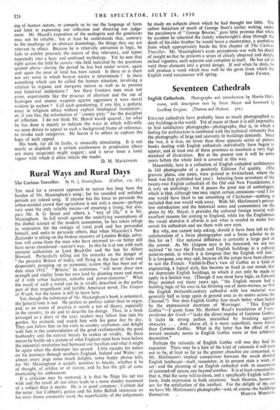Rural Ways and Rural Days
The Curious Traveller. By H. J. Massingham. (Collins. 12s. 6d.)
THE need for a reverent approach to nature has long been the burden of Mr. Massingham's song ; for his rounded and polished periods are indeed song. If anyone has the force to persuade the urban-minded crowd that agriculture is not only a means—perhaps very soon the only reliable means—of ensuring a living, but also, pace Mr. A. G. Street and others, a " way of life," it is Mr. Massingham. In full revolt against the underlying assumptions of the dismal science of the modern economists, he has taken refuge in veneration for the vestiges of rural craft and has persuaded himself, and seeks to persuade others, that when Macaulay's New Zealander is sitting on the broken masonry of London Bridge, salva- tion will come from the men who have returned to—or better still have never abandoned—nature's way. In this he is at one with such eminent authorities as Lord Boyd-Orr and the late Sir Albert 'Howard. Particularly telling are his remarks on the danger of " the parasitic Britain of today, still flying in the face of facts and desperately propping up an economic system that has been out of date since 1914." " Britain," he continues, " will never draw new strength and vitality from her own land by planting more and more of it with urban factories, suburbs and power-stataions." What the result of such a trend can be is vividly described in the earlier part of that magnificent and terrible American novels The Grapes of Wrath, but the lesson is still to learn here. Yet, though the substance of Mr. Massingham's book is polemical, the 'general tone is not. He prefers to portray rather than to argue, and, as an ounce of practice is worth a ton of theory, especially in the country, to do and to describe his doings. Thus, in a book arranged as a diary of the year, readers may follow him into his garden, his orchard, and watch him with his geese day by day. They can follow him on his visits to country craftsmen, and delight with him in the contemplation of the good craftsmanship, the good husbandry and the natural beauty he evokes so vividly. By these means he builds up a picture of what England must have been before the industrial revolution had bemused our faculties and what it might be again when the distemper has passed. Little escapes his notice on his journeys through southern England, Ireland and Wales ; on almost every page some touch delights, some happy phrase tells, for Mr. Massingham is acutely sensitive to beauty, whether it be of thought, of artifice or of nature, and he has the gift of com- municating his enthusiasm. If a criticism may be ventured, it is that he flings his net too wide and the result all too often leads to a more slender treatment of a subject than it merits. He is in good company ; Cobbett did the same ; but Cobbett's genius and his John Bullish insistence on his main theme constantly mask the superficiality of the iudgements he made on subjects about which he had thought too little. The callow Socialism of much of George Sturt's earlier writing, under the pseudonym of " George Bourne," gave little promise that when by accident he inherited the family wheelwright's shop through the death of his elder brother he would leave a masterpiece, a quotation from which appropriately heads the first chapter of The Curious Traveller. Mr. Massingham's acute perceptions war with his depth of insight so that he presents a series of closely observed and deeply etched vignettes, each separate and complete in itself. He has yet to weld these elements into a grand design. If and when he does, he will produce a work which may well be the germ from which the English rural renaissance will spring. JOHN FILMER.


































 Previous page
Previous page